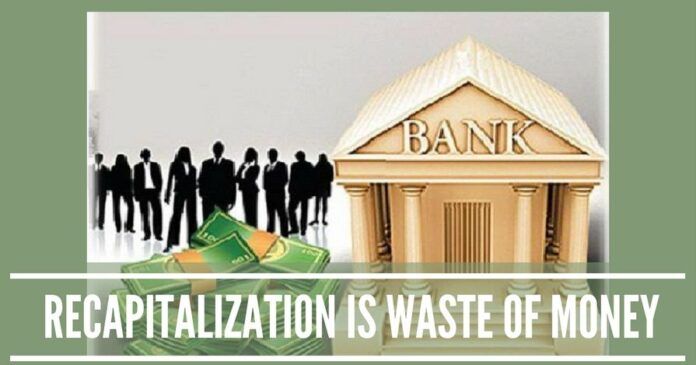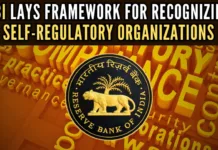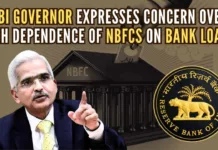
Bank privatization is the elephant in the room that nobody is willing to look at
Child marriage is a social evil, so it should be eradicated. But what if everybody seeks to preserve it? It’s tradition, after all, a few say; suppose everybody else starts following them. So, instead of doing away with the practice whose ill effects are widely recognized and well-documented, the entire system goes on to make it less painful for the bride, the groom, and society.
The Narendra Modi government’s announcement that Rs 211,000 crore would be infused into public sector banks (PSBs) over the next two years is a similar solution. Instead of doing away with the evil—that is, state ownership of banks—the government is desperately trying to mitigate its worst effects.
On October 24, the government decided to capitalize PSBs “through budgetary provisions of Rs 18,139 crore, recapitalization bonds to the tune of Rs 135,000 crore, and the balance through [the] raising of capital by banks from the market while diluting government equity (estimated potential Rs 58,000 crore).”
Cronies of netas have not only got sweetheart deals but also enjoyed the ‘evergreening’ of loans—that is, top management of banks continuing to lend to financially unviable projects
Government actions are not limited to addressing capitalization of PSBs, said an official press release. “Definite steps will be taken alongside capitalization to enable them to play a major role in the financial system. PSBs having 70 percent market share in the banking space will be geared for greater growth and to contribute through enhanced credit off-take.”
Noble intentions indeed, but questions about the efficacy of the huge drain on the exchequer remain. Earlier, in August 2015, the Modi regime had chalked out something called the Indradhanush Plan. It infused the capital of Rs 51,858 crore in PSBs. Before that, in the wake of the 2008 global financial meltdown, the UPA government had capitalized PSBs with Rs 67,734 crore. To little avail, it seems.
According to the press release, gross non-performing assets or NPAs in PSBs rose rapidly from 5.43 percent (Rs 278,466 crore) in March 2015 to 13.69 percent (Rs 733,137 crore) as of June 2017. Provisioning for expected losses also grew substantially.
In other words, PSBs have become a black hole, which keeps guzzling taxpayer money. Tens of thousands of crores of rupees have been spent to revive state-run banks—without any evident benefit to them, the exchequer, or the economy. The cost is borne not just by the exchequer but by the entire economy, for high NPAs force banks to be extra-cautious in lending, thus slowing down economic activity. Economic growth and development are adversely affected; the employment situation, already pretty bad, further worsens.
The reason is as well known as Newton’s laws—government ownership. Which means they are practically run by politicians and bureaucrats—not the exemplars of competence and honesty. The current ‘twin balance-sheet’ problem—badly performing corporations have not only hurt their own shareholders but also the lending banks because of huge NPAs—has arisen primarily because of political interference in the operations of PSBs. Cronies of netas have not only got sweetheart deals but also enjoyed the ‘evergreening’ of loans—that is, top management of banks continuing to lend to financially unviable projects so that they don’t show as NPAs on their own balance sheets.
Bank privatization is the elephant in the room that nobody is willing to even look at—and all of them going around in circle
Then there is the issue of top management having no sustained personal stake in the financial health of PSBs. A retired senior official of a big PSB informed me that there were standing instructions from the chairman that NPAs should not reflect on paper. This helped the chairman keep his own record good; inevitably, his successor had to deal with skyrocketing NPAs. The chairman of a private bank is unlikely to sweep bad debts under the carpet; he may do some financial jugglery to doll up the balance sheet, but won’t do anything to hurt the long-term prospects of his bank. This is also the reason that the NPAs of private banks are much lower in percentage terms.
Redemption lies in privatization, for the original sin was bank nationalization. Every sensible economist knows this. In 2014, the P.J. Nayak Committee had also recommended privatization of state-owned banks. Recently, Chief Economic Adviser Arvind Subramanian voiced a similar opinion. Bank privatization is the elephant in the room that nobody is willing to even look at—and all of them going around in circles. And they are coming up with solutions akin to making child marriage less harmful.
Note:
1. The views expressed here are those of the author and do not necessarily represent or reflect the views of PGurus.
- Liberty Is Penalized, Violence Goes Untouched - December 21, 2019
- Rahul’s Howdy bloomer - September 22, 2019
- Chidambaram’s hypocrisy - August 22, 2019











Nationalization was easy. But denationalization is tantamount to political suicide. It is the same with reservations, notwithstanding what the Constitution says. No leader / party in India will dare to say that (s)he will privatize banks although everyone knows that it is perhaps the only lasting solution. To me, there seem to be only three ways out – (i) Do what Indira Gandhi did – declare Emergency and initiate such reforms; But this is not going to happen because the world is a different place today than it was in 1975. (ii) Wait for the majority of the electorate to get enlightened about their own interests; Given India’s size, this will take 50+ years assuming every Govt. works towards this goal (which won’t happen). (iii) Break India to smaller pieces and hope that at least some will get an enlightened democratic leadership. Ain’t gonna happen, you say? Then we are up s* creek without a paddle.
I overlooked a fourth possibility – Declare Financial Emergency under Art. 360 of the Constitution (has never been done before) and get economic reforms through.
[…] Read the full article: https://www.pgurus.com/bank-recapitalization-waste-money/ […]
If people like Ahmed Patel can loot the banks and get away with it, nothing can be done to improve the banks
Totally agree.
Lost public assets must be made up from the loanees by selling off the property left in enterprise,their personal/family property andthe rest be recovered from erring BANK EMPLOYEES.
It is like internal Economic Terrorism by Politicians in Power and their appointee puppet PSB/PSU heads. When will such stupid game stop for good.